Business Ethics Course Singapore
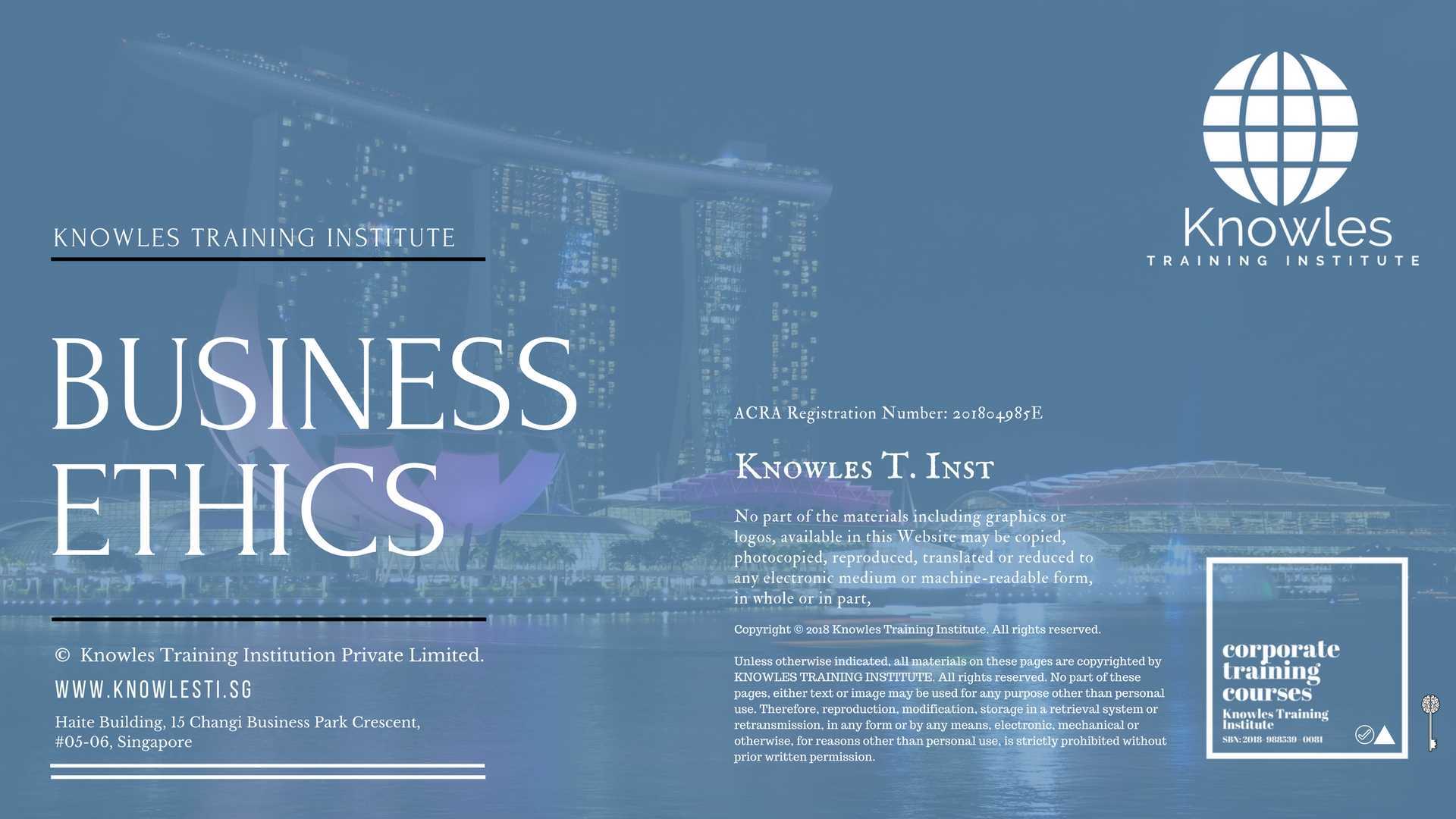
About This Business Ethics Training course
Business Ethics![]() Course in Singapore
Course in Singapore
Business Ethics is the set of rules followed by business professionals in order to promote standard and acceptable practices that businesses agree to follow. In this modern age, such ethics apply to both the company and its employees by holding them accountable for their actions. The impact of unethical behaviour is often understated, yet it is a major factor that promotes or inhibits the productivity of a business.
Learning about Business Ethics helps companies and businesses develop a culture of professionalism which builds the credibility of a business to the public market and showcases their willingness to engage in honest business.
In this Business Ethics course, participants will learn the standard principles followed by businesses and their relevance in maintaining a healthy business environment and workplace. This course will tackle the use of business ethics in two major parts. The first part will discuss the practice of doing honest business, while the second part will discuss promoting professionalism in the workplace.
Who Should Attend This Business Ethics Workshop
This Business Ethics![]() workshop is ideal for anyone who would like to gain a strong grasp and improve their Business Ethics
workshop is ideal for anyone who would like to gain a strong grasp and improve their Business Ethics![]() .
.
All Staff Within An Organisation
Managers
Team Leaders
Executives
Assistants
Officers
Secretaries
Group Size For This Business Ethics Training Program
The ideal group size for this Business Ethics![]() course is:
course is:
Minimum: 5 Participants
Maximum: 15 Participants
Course Duration For This Business Ethics Skills Course
The duration of this Business Ethics![]() workshop is 2 full days. Knowles Training Institute will also be able to contextualised this workshop according to different durations; 3 full days, 1 day, half day, 90 minutes and 60 minutes.
workshop is 2 full days. Knowles Training Institute will also be able to contextualised this workshop according to different durations; 3 full days, 1 day, half day, 90 minutes and 60 minutes.
2 Full Days
9 a.m to 5 p.m
Business Ethics Course Benefits
Below is the list of course benefits of our Business Ethics course
Prevent problems in the business operations caused by unethical behaviour of employees
Actualize a culture of professionalism in the workplace
Promote the business’ corporate identity through professionalism of employees
Align employees with the business’ conduct of ethics
Obtain skills needed for building a professional personal image
Business Ethics Course Objectives
Below is the list of course objectives of our Business Ethics course
Develop an understanding of the purpose of business ethics
Identify gaps and problems faced involving unethical business behaviors
Assess the business’ code of ethics and determine its applicability
Determine corrective measures for unethical business behaviour of employees
Prevent issues on discrimination against gender, race, and disability
Reduce instances of corrupt and unethical behavior of employees
Resolve issues involving unethical behaviour of the business and its employees
Establish business strategies that are coherent to business laws and ethics
Implement comprehensive and up-to-date business ethics and standards
Integrate business ethics into business decisions
Incorporate the Corporate Social Responsibility (CSR) to business objectives
Monitor the implementation of code of ethics in promoting professionalism
Course Content For This Business Ethics Training Course
Below is the list of course content of our Business Ethics training course
- What Is Business Ethics?
- A human being’s personal ethics determine distinct standards of right and wrong. Ethics allow people to resolve what they should do in a given situation. Each person develops ethical standards, and each individual should examine personal morals and behaviour.
- 10 Benefits of Managing Ethics
- Operating an ethical business has several rewards. The circumstances of each company will determine the results of managing ethics. There are, however, ten common benefits that all companies have when they handle their business ethics.
- Benefits
- We discussed the top ten benefits of maintaining ethics in the previous module. Implementing ethics in the workplace will also lead to higher profits and long-term growth. Unethical business practices can cause immediate financial gain, but they will cost companies customers and employees over time.
- Guidelines for Managing Ethics in the Workplace
- Managing ethics in the workplace requires specific tools. Every organisation needs a Code of Ethics, a Code of Conduct, and Policies and Procedures, which we will address later. These tools direct the organisation as leaders attempt to manage ethics.
- Roles and Responsibility
- The roles and responsibilities essential to effectively implement workplace ethics will differ with each organisation. A manager should be in place to supervise the ethics program, but he or she will need the support provided by other positions. Smaller organisations may not need to fill all of the roles listed below; determine what your company requires before executing an ethics program.
- Privacy Policies
- Employee privacy is a complicated legal issue. Companies get detailed personal information about their employees for background checks and other reasons, and they need to declare the purpose of collecting this information and how it will be utilised in their privacy policy. Personal data must be protected and kept classified, and the employees need to agree to the background checks.
- Harassment Issues
- Companies are legally obliged to provide a safe working environment for all of their employees. Employees can sue their employers for not shielding them from harassment. The EEOC protects the rights of individuals from discrimination and harassment, regardless of ethnicity, sex, religion, sexual orientation, disability, age, etc.
- Technology
- As technology advances, so does the clarity about employer and employee rights. Employers have the right to expect their employees to work productively and represent the company well. However, employees have the right to personal privacy.
- Identfying Types of Responsibilities
- There are different types of responsibilities associated to businesses. Ethical organizations need to cover different areas of responsibility and consider the social ramifications of their actions.
- Handling Conflicting Social and Business Responsibilities
- Sometimes social and business obligations conflict with each other. This is especially true when social business practices cut into shareholder earnings. This is a struggle for most public enterprises.
- The Basics
- People typically use five distinct ethical standards to evaluate the world around them. For the best results, put the various approaches together and choose the answers that best fit.
- Balancing Personal and Organisational Ethics
- It is crucial to be ethical on a personal and organisational level. Personal ethics influence decision both inside and outside of work. These are based on individual beliefs and values.
- Common Dilemmas
- There are many different ethical dilemmas in business that are specific to industries. There are, however, common dilemmas that every organisation will face.
- Making Ethical Decisions
- Before making any conclusions, use the following steps to make sure that you are executing ethical decisions. Determine the ethics of a situation: Does the decision influence a group or have legal ramifications Gather Information: Study as much as possible about the case, and get the point of view from all parties involved.
- Overcoming Obstacles
- There will always be the temptation to behave unethically. These obstacles are especially challenging to overcome when other people are urging you to act unethically. They may be in positions of power or merely intimidating, but you do not have to give into them.
- Criteria and Risk
- The word “whistleblower” is British, and it comes from the whistles that the police used to carry to signal the public and other police to a felony. Whistleblowers point out serious infractions that break the law; risk public or employee health; fraud; or signs of corruption. Reporting on a co-worker who was late is not whistleblowing.
- The Process
- There are a couple of types of whistleblowers: internal whistleblowers and external whistleblowers. Internal whistleblowers go to someone within the organisation to notify a problem. Many companies have methods of doing this anonymously so that the employee will be protected from vengeance.
- When You Should “Blow the Whistle”
- Think carefully before blowing the whistle. Doing so is neither enjoyable nor easy. There are situations, however, when blowing the whistle is the right thing to do. If the rights, health, or safety of others is knowingly compromised, and no one will fix the problem, the whistle needs to be blown.
- Ethical Management
- Ethical management balances the diverse responsibilities of modern business organisations. All companies are responsible for making a profit to survive and fulfil their other obligations.
- Identifying the Characteristics
- There are various characteristics of ethical management. There are three attributes, however, that people identify with ethical management: integrity, transparency and utilitarianism.
- Ensuring Ethical Behaviour
- Because ethics and values are incredibly personal, it is difficult to ensure that all employees will practice ethical behaviour. There are ways to promote ethical conduct, however, by merely instilling a few basic rules.
- Recognise & Identify
- Stress can take its toll on employees, who will occasionally act out at work. When unethical behaviour begins, managers need to identify it as soon as possible. Allowing unethical behaviour to continue will have long-term consequences for the company.
- Preventing
- Preventing unethical behaviour is much easier than dealing with the aftermath. We have already discussed ways to prevent unethical behaviour such as implementing a code of ethics and ethical policies and taking swift action. Another tactic that can deter unethical behaviour is improving job satisfaction. Employees often respond to situations they feel are unfair.
- Addressing
- Unethical behaviour needs to be addressed carefully. It is essential to discuss the situation face-to-face. If the conduct explicitly violates company policy, remind the person about the policy. If the circumstance is a grey area, you may have to explain why it was not ethical.
- Interventions
- Workplace interventions transpire when people are concerned about the well-being of their co-workers. Responses are typically utilised to help co-workers with addiction predicaments such as alcohol or drug abuse. They can also be held when aiding co-workers in dealing with unethical behaviour committed explicitly at work.
- Organisations Basics
- When building an ethical business, the roles and responsibilities of each member of the company must be clearly outlined. An organisational chart will help determine how an ethics program will run. There will need to be a chain of command overseeing the ethics program.
- Addressing the Needs
- The needs of the organisation should be determined by surveying both customers and the employees. Most companies have a plan to gauge customer satisfaction. The company culture, however, is a clue to the ethics of the business.
- Ethical Principles
- An organisation’s ethical principles should speculate its needs. For example, a company that ranks low in personal responsibility plausibly has a bullying problem and needs to create policies that address the issue. There are a few basic business ethics principles that most companies can benefit from instituting.
- Ethical Safeguards
- Ethical safeguards require to be in place to guarantee ethical behaviour. Safeguards take away the justification that employees do not know better. Safeguards do more than protect the company; they help bring in work.
- Developing a Code of Ethics
- A Code of Ethics is the basis of an ethics curriculum. The Code of Ethics needs to address specific concerns. Laws and regulations: All legal obligations need to be acknowledged.
- Performing an Internal Ethics Audit
- An internal ethics audit utilises several different sources. An auditor (or a committee, if there is no auditor) usually goes over the data to determine if any modifications need to be executed.
- Upholding the Ethics Program
- There needs to be total buy-in for an ethics program to be successful. It is not implemented to keep employees from stealing office supplies. Managers must uphold the ethics program by adhering to it themselves and holding all of their employees to the same standards.
Business Ethics Value Added Materials
Each participant will receive the following materials for the Business Ethics course
Business Ethics Learner’s Guide
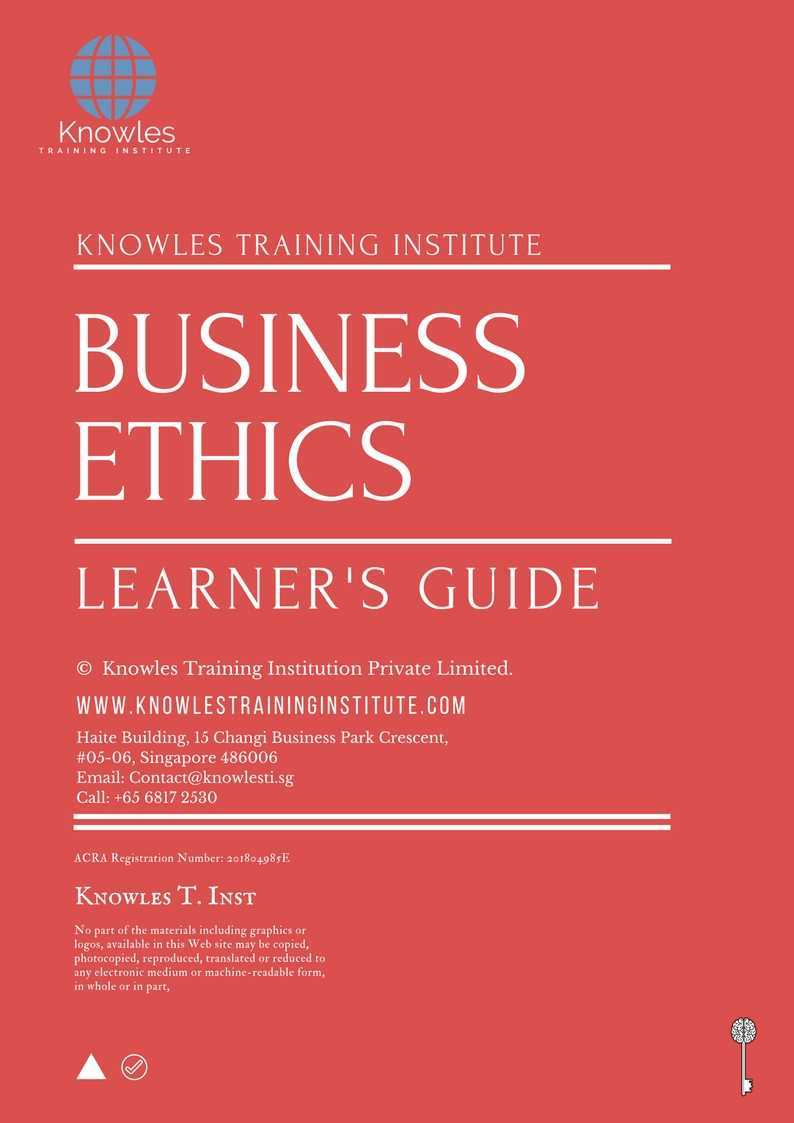
Business Ethics Key Takeaways Notes
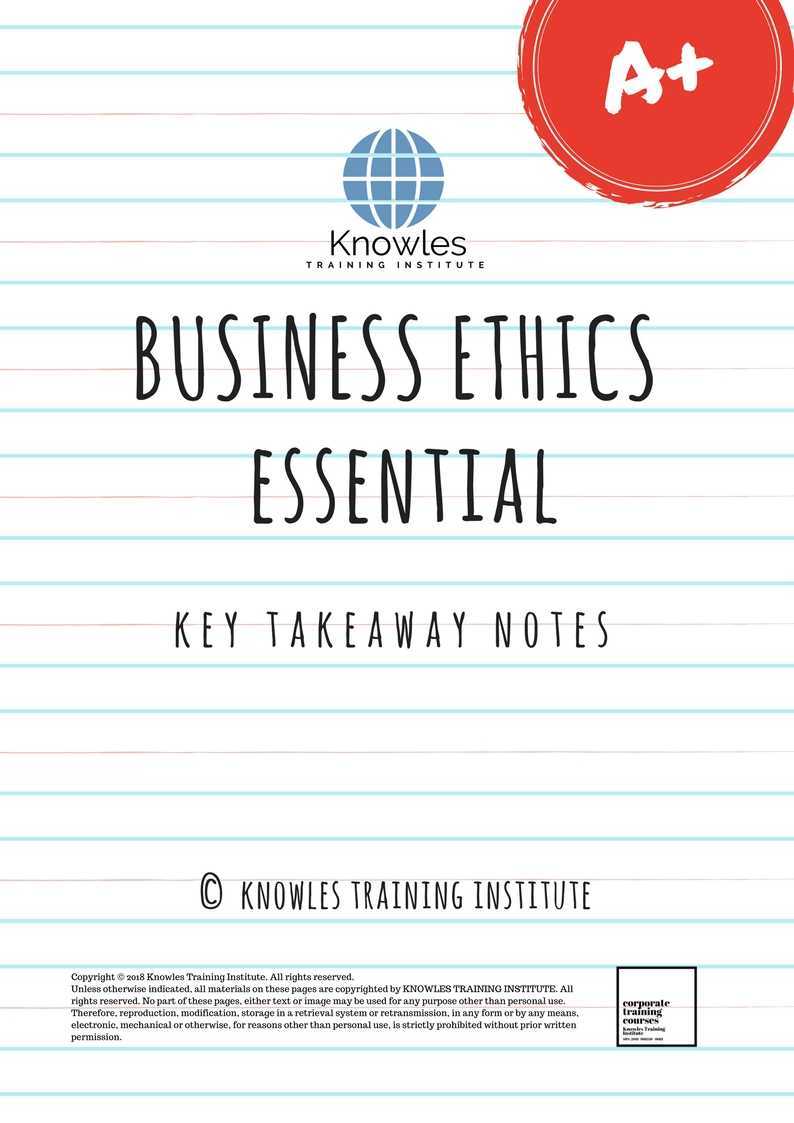
Business Ethics Essentials Ebook

Business Ethics Course Handouts
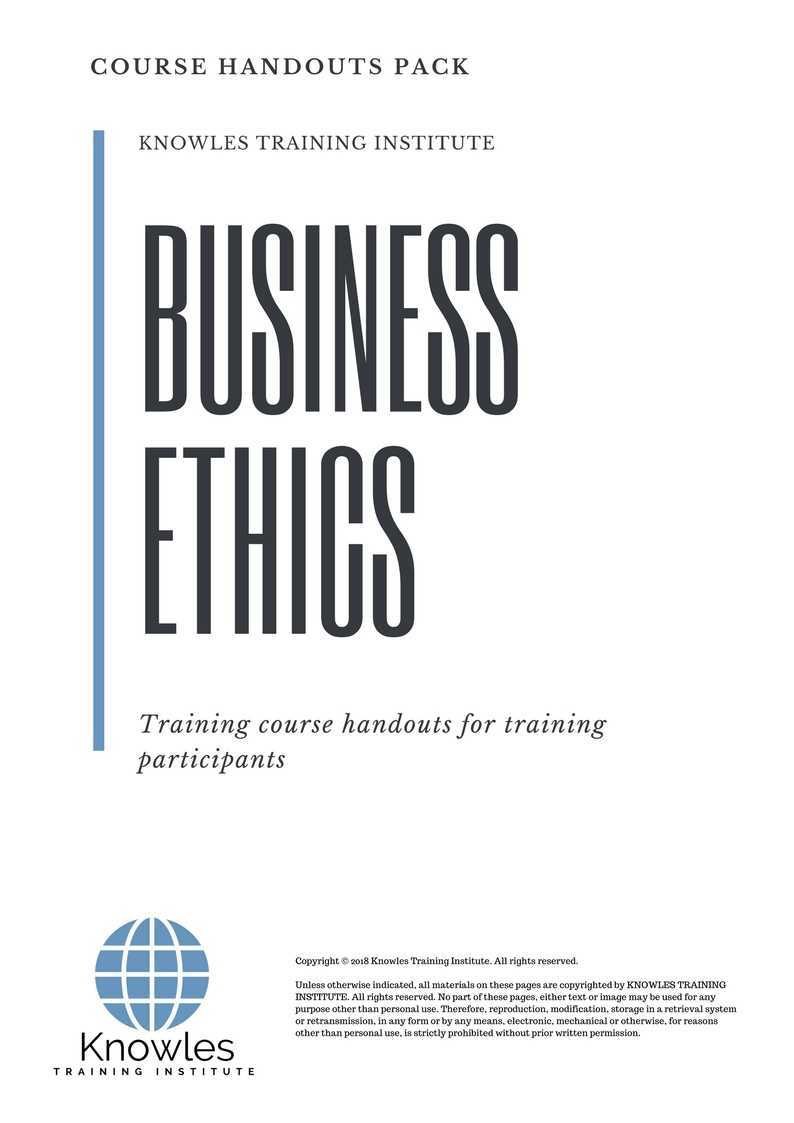
Business Ethics 30-Day Action Plan
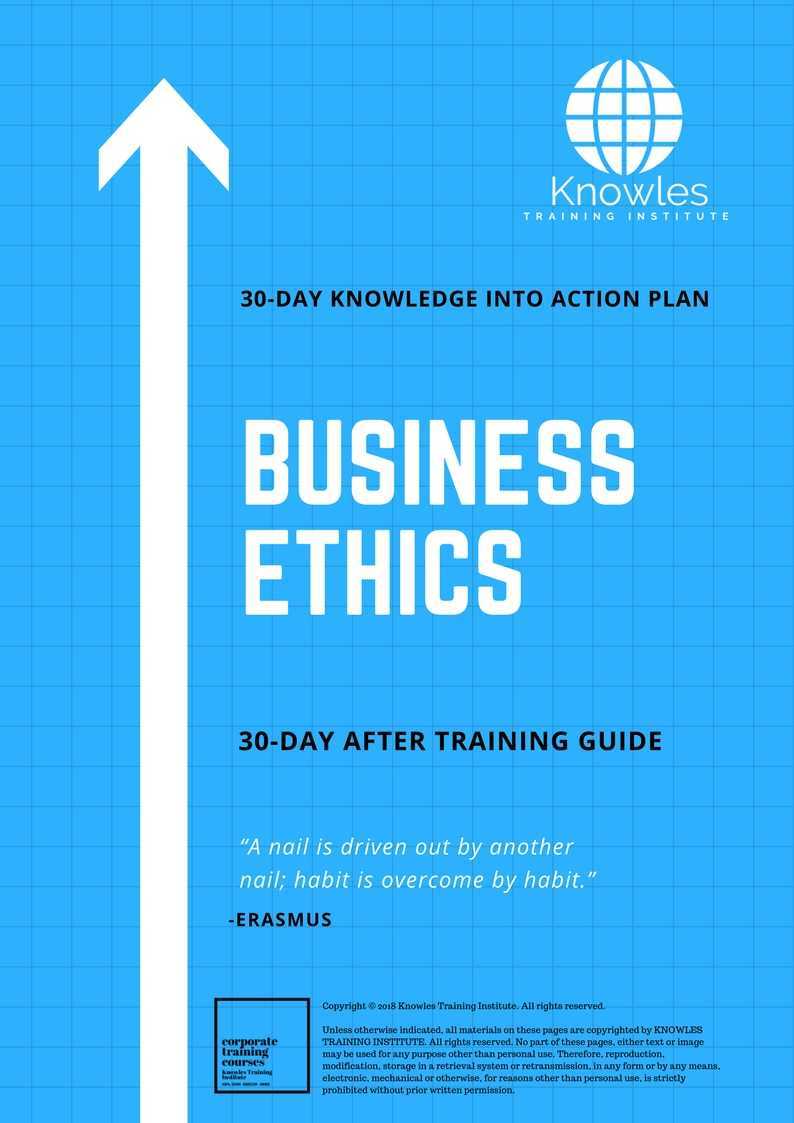
Business Ethics MindMaps Pack
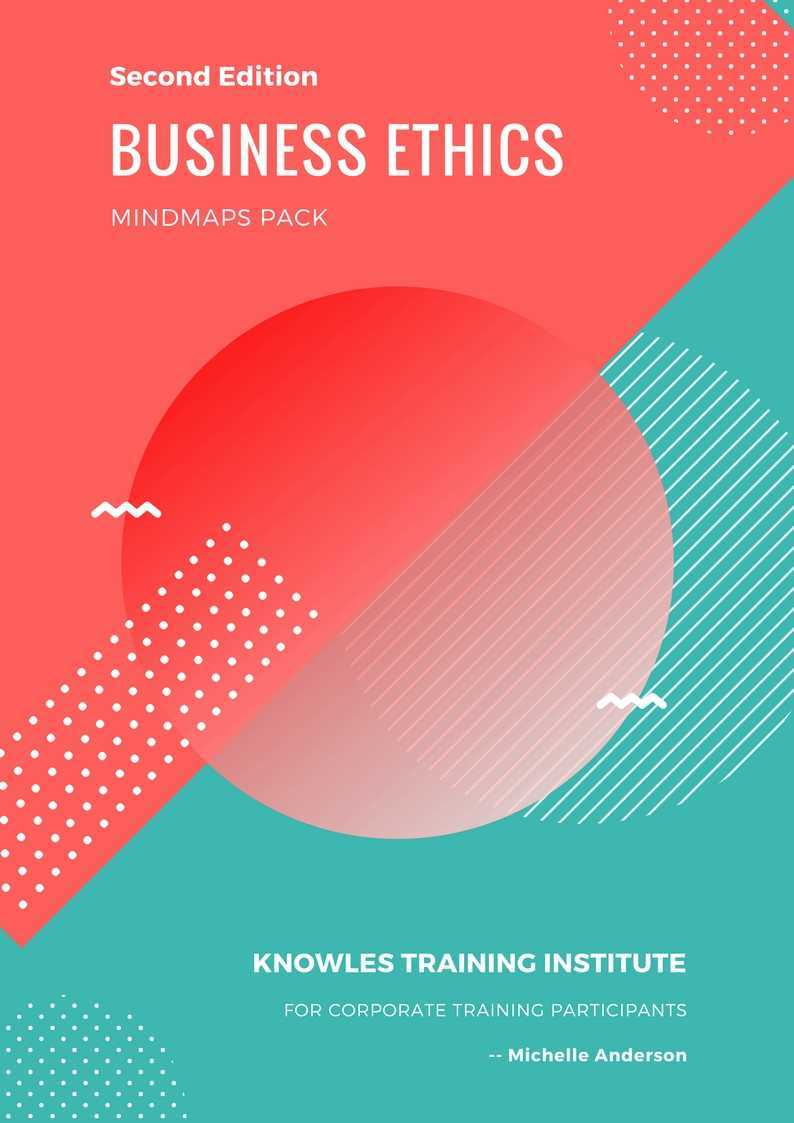
Business Ethics PPT Slides Used During Course

Business Ethics Long-Term Memory Flashcards Pack
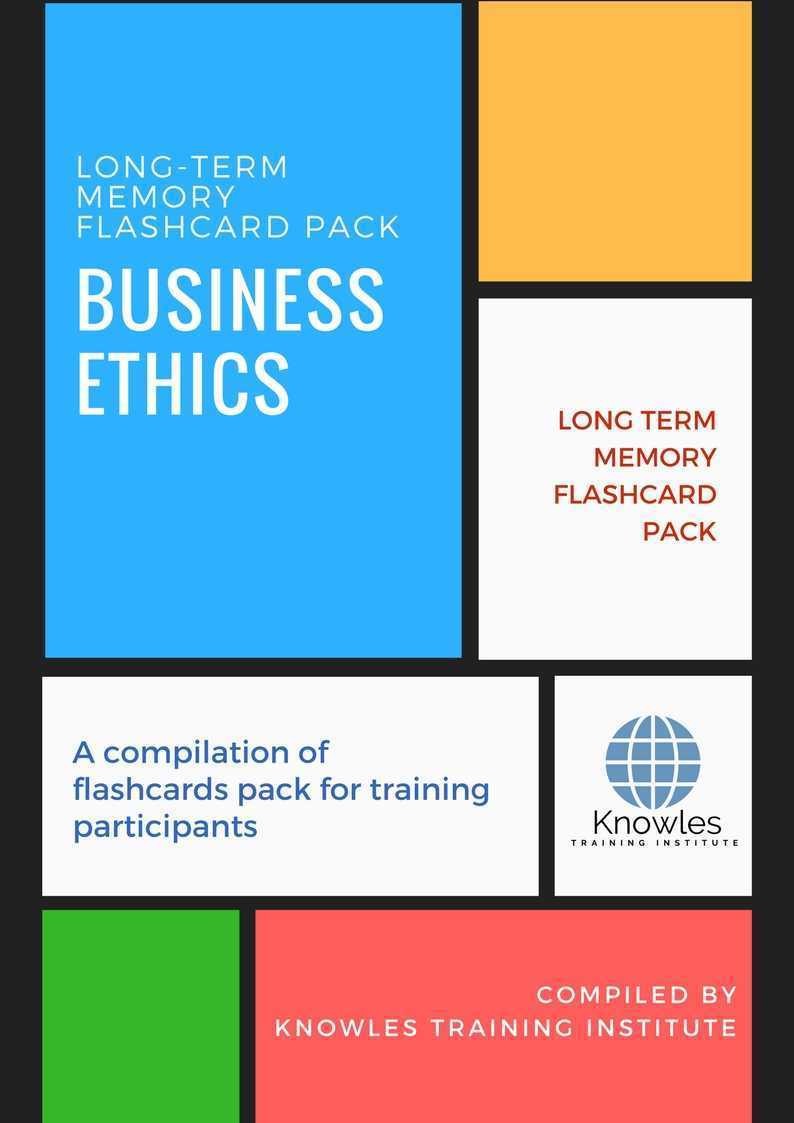
Business Ethics E-Learning Course
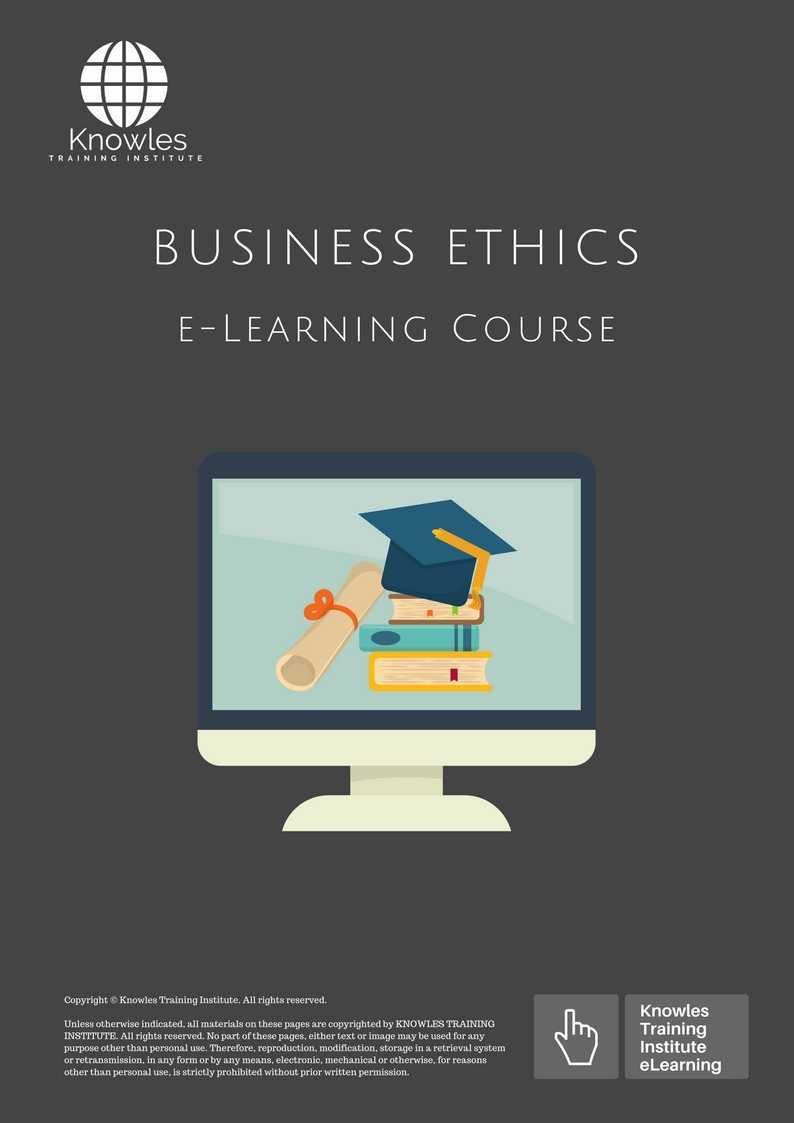
Business Ethics Online Video Course
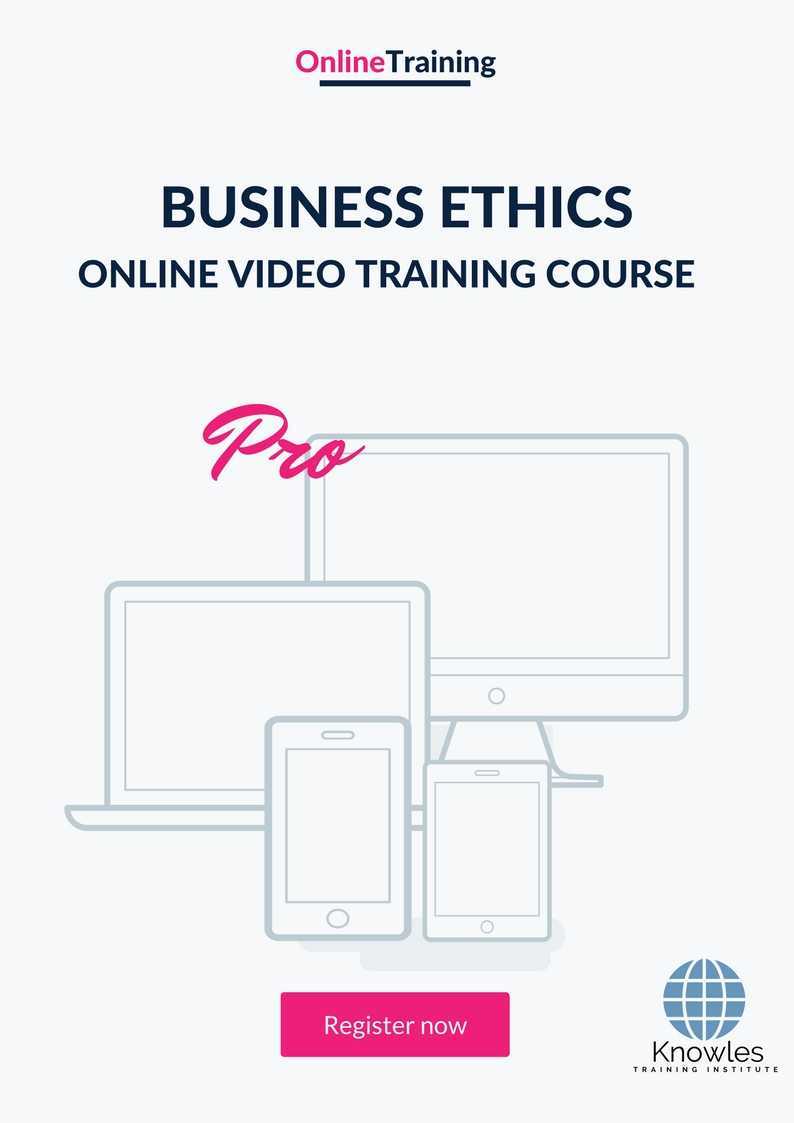
Business Ethics Essentials Audiobook
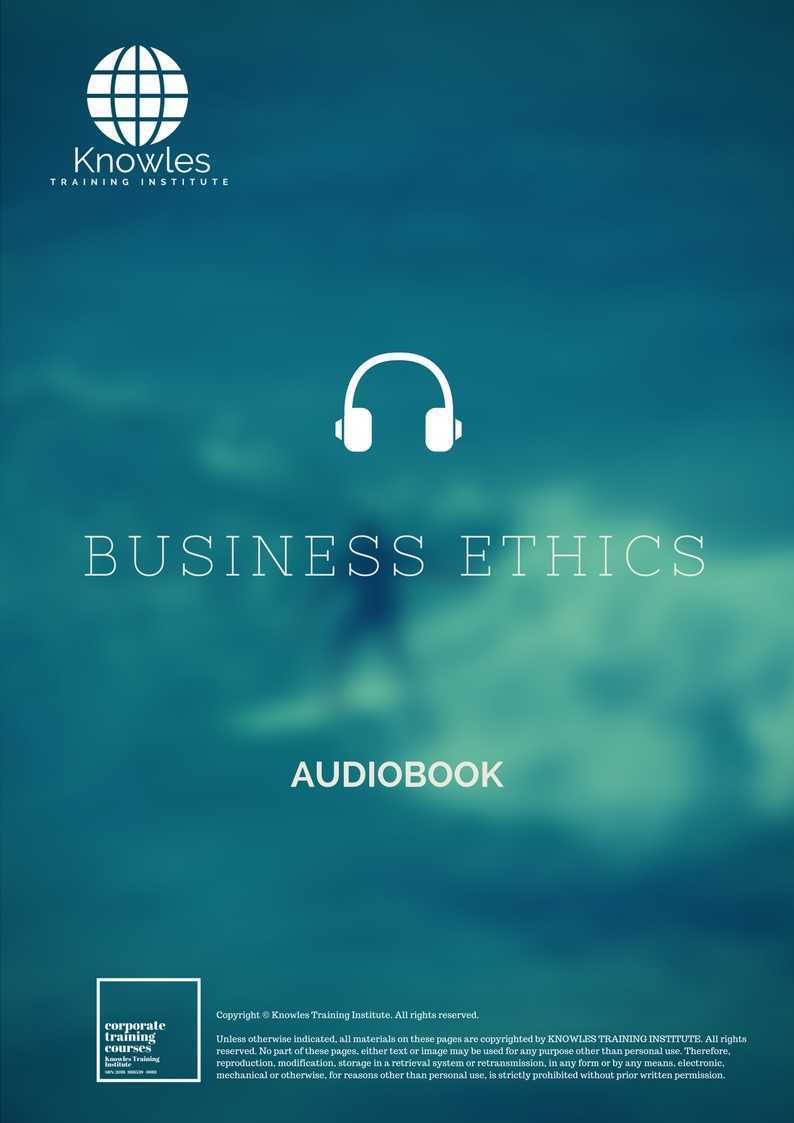
Business Ethics Infographics Pack
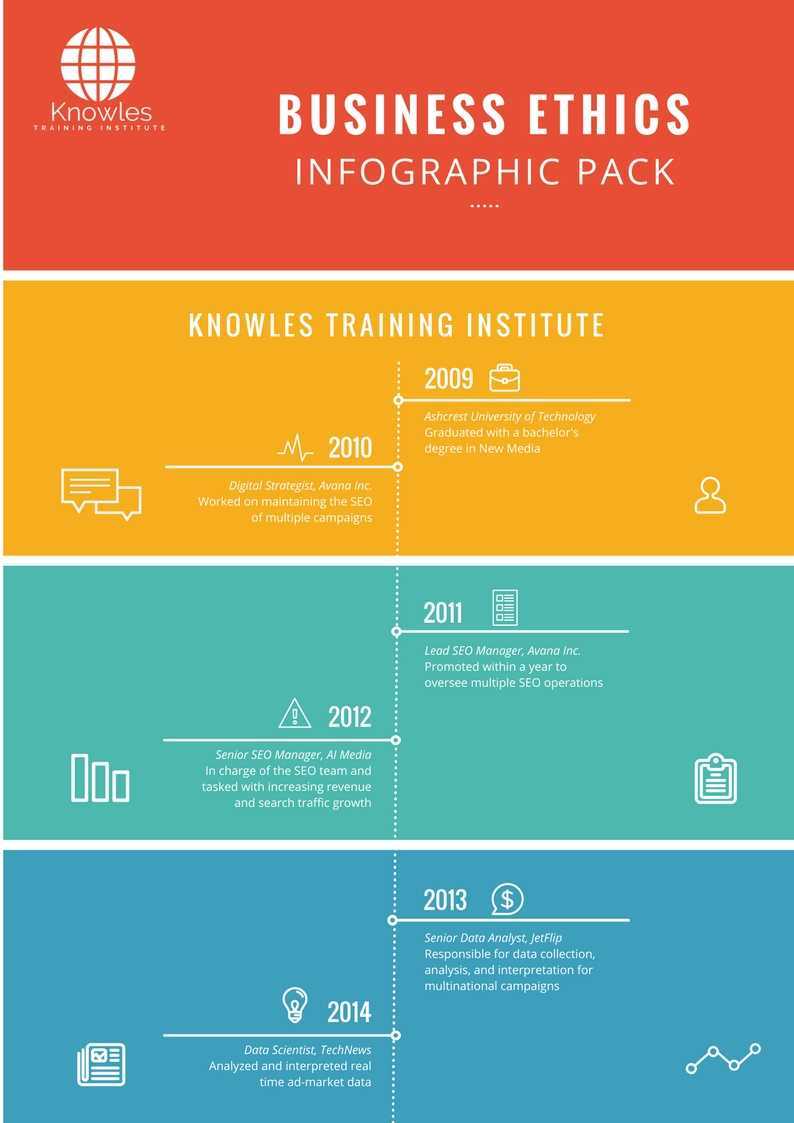
Business Ethics Certification
Each course participant will receive a certification of training completion
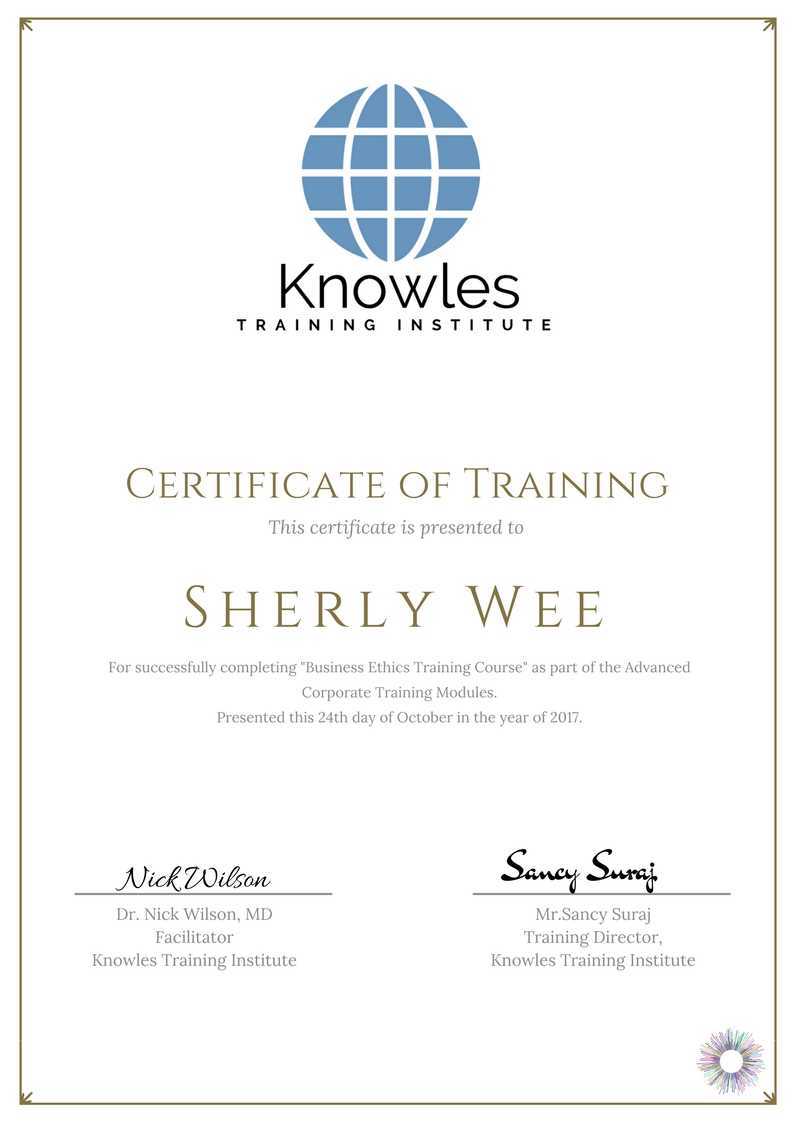
Course Fees
There are 4 pricing options available for this Business Ethics training course. Course participants not in Singapore may choose to sign up for our online Business Ethics training course.
- SGD 889.97 For a 60-minute Lunch Talk Session.
- SGD 389.97 For a Half Day Course Per Participant.
- SGD 589.97 For a 1 Day Course Per Participant.
- SGD 789.97 For a 2 Day Course Per Participant.
Discounts available for more than 2 participants.
Upcoming Business Ethics Training Course Schedule
Contact us for the latest Business Ethics course schedules:
Phone: +65 6714 6663
Email: contact@knowlesti.sg
Message:
Download Business Ethics Course Brochure
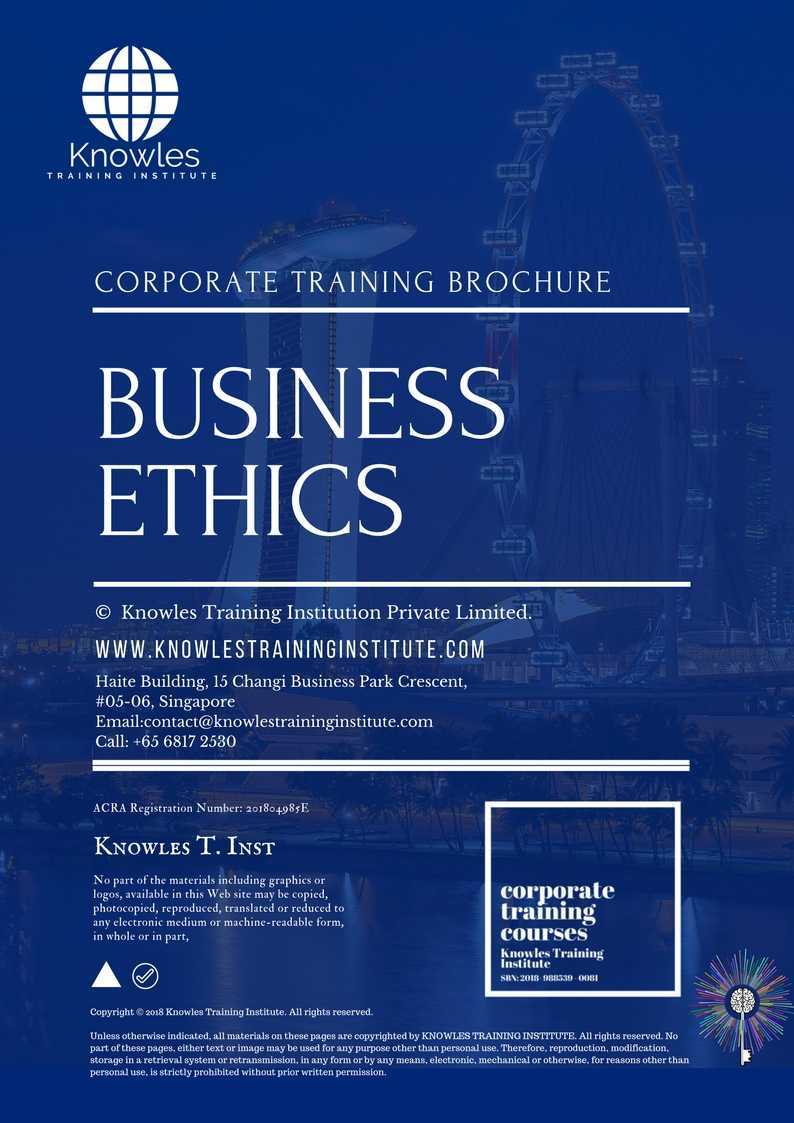
Request for this Business Ethics course brochure. Fill up the short information below and we will send it to you right away!
Post-Training Support: A vast majority of training does not have any effect beyond 120 days. But to work, training has to have a strong pre- and post-training component. Post-training reinforcement consequently helps individuals to recall the understanding and ask questions.
Blended Learning: Learning does not occur in the classroom. Virtually everybody prefers distinct ways of learning. Successful learning should have a multi-channel, multi-modal strategy.
We Understand The Industry: Similarly, we’ve got a profound comprehension of the business, business design, challenges, strategy and the that our participants are in and have designed the courseware to cater to their professional needs.
Course Content: Knowles Training Institute’s material is relevant, of high quality and provide specific learning outputs. As a result, Participants will leave the training course feeling as they have gained a strong understanding and will also be in a position to execute what they have learned sensibly.
Course Development — The workshop modules follow a systematic and logical arrangement. Therefore, this structure helps to ensure that the course material allows the facilitators to deliver the course in a logical arrangement. Consider the subjects as building bricks into learning, our facilitators slowly build towards a comprehensive picture of this entire topic.
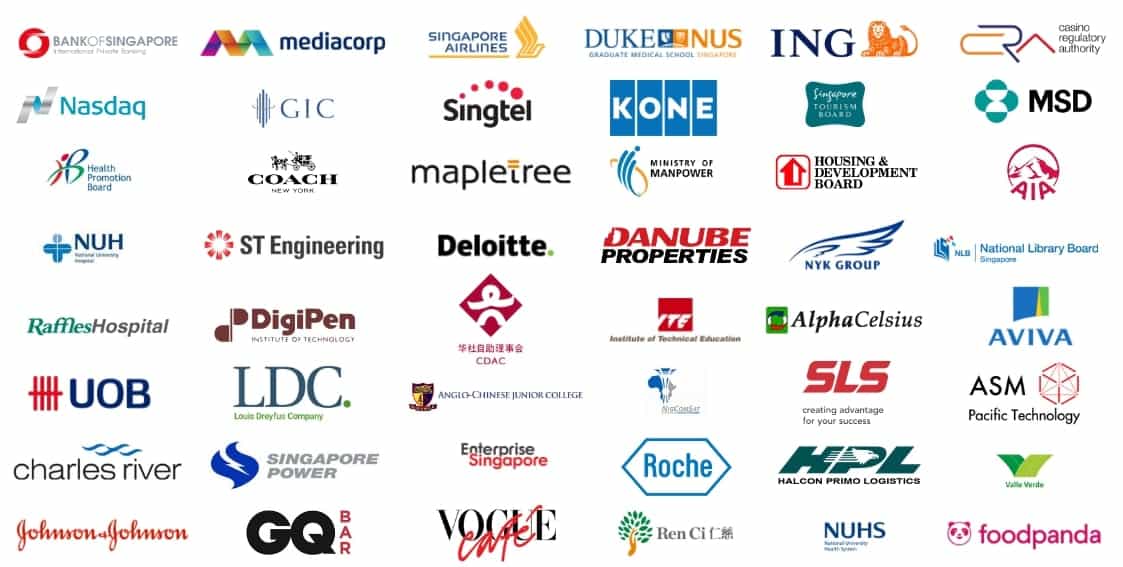

Course Enquiries

Fill up the form and we will get back to you in less than 1 working day.
Alternatively, give us a call to have one of our training consultants contact you. Our corporate training courses can be contextualized to meet your organization’s training needs. Leverage on our large pool of professional trainers and consultants for your organization’s training needs.
Office Address: 60 Paya Lebar Rd, #07-54 Paya Lebar Square, Singapore 409051
Office Phone: +65 6714 6663
Email: contact@knowlesti.sg
We Guarantee 100% Privacy. We Respect Your Privacy. Your Information Will Never Be Shared.
Questions
Register Now
Register For This Business Ethics Course Now!
Business Ethics course, workshop, training, class, seminar, talk, program, programme, activity, lecture. Effective Business Ethics courses, workshops, classes, seminars, talks, programs, programmes, activities, lectures in Singapore. The best Business Ethics improvement tips, Business Ethics techniques, improve Business Ethics, improve Business Ethics games, Business Ethics improvement exercises, improve Business Ethics power, how to have good Business Ethics, how to have good Business Ethics in studying, how to build up your Business Ethics, how to improve Business Ethics how to improve Business Ethics course in Singapore. Enhance, boost, build up, enlarge, heighten Business Ethics course in Singapore. Increase, intensify, raise, reinforce, strengthen Business Ethics. Upgrade, amplify, boom, elevate, exaggerate, magnify, grow, gain Business Ethics. Develop Business Ethics, multiple, power up, beef up, bolster, establish, extend Business Ethics. Invigorate, restore, step up, toughen, empower, fortify, regenerate Business Ethics. Rejuvenate, renew, escalate, expand, maximize Business Ethics. Powerful, mighty, impressive, competent, great, excellent, exceptional Business Ethics in Singapore. Superb Business Ethics. Super, superior, strong, solid, active Business Ethics training courses and workshops in Singapore.Practical Business Ethics enhancement, booster, building up, enlargement, heightening, increment, strengthening, amplification.Business Ethics maximization, power training courses & workshops in Singapore.


